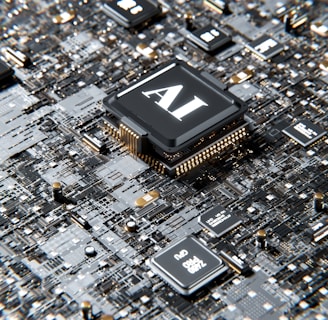Disruptions in the global job market
The Impact of AI on the Global Job Market: Transformation, Challenges & Opportunities
1/27/20252 min read


Artificial Intelligence (AI) is reshaping the global job market at an unprecedented pace. While automation and AI-driven technologies improve efficiency and productivity, they also bring concerns about job displacement, skill gaps, and the evolving nature of work. As businesses and professionals navigate this transformation, understanding AI’s impact is crucial.
1. Job Displacement vs. Job Creation
One of the biggest concerns surrounding AI is its potential to replace human jobs. Automation and AI-powered systems are increasingly taking over repetitive and routine tasks, leading to job losses in certain industries.
🔹 Jobs at Risk:
Data entry and clerical roles
Customer support (chatbots and AI-driven assistance)
Manufacturing and assembly line jobs
Basic accounting and administrative functions
However, AI is also creating new job opportunities in fields such as AI development, data science, cybersecurity, and human-AI collaboration roles.
🔹 New Jobs Emerging:
AI specialists and data engineers
AI ethics consultants
Robot maintenance and AI system supervisors
Digital transformation strategists
2. Rise of AI-Augmented Roles
Instead of completely replacing humans, AI is augmenting job roles by handling repetitive tasks and allowing professionals to focus on higher-value work.
💡 Examples:
Doctors using AI to diagnose diseases more accurately
Marketers leveraging AI for customer insights and campaign optimization
Lawyers using AI to analyze legal documents efficiently
HR professionals utilizing AI-driven hiring and performance analysis tools
Employees who adapt by learning to work alongside AI will thrive in this evolving job market.
3. Shift in Required Skills & Reskilling Needs
The demand for traditional skills is declining, while the need for AI-related expertise is skyrocketing. The future workforce will need to focus on:
✅ High-Demand Skills:
AI and machine learning
Data analytics and cybersecurity
Critical thinking and problem-solving
Emotional intelligence and human-centric roles
Governments and corporations are investing heavily in reskilling programs to help workers transition into AI-driven jobs. Upskilling will be crucial for professionals to remain competitive.
4. The Gig Economy & AI-Driven Work Models
AI is fueling the expansion of the gig economy by enabling freelancers and independent contractors to find work more efficiently through AI-powered job-matching platforms.
🌎 Trends in the AI-driven gig economy:
Remote work and AI-powered virtual teams
On-demand project-based hiring through AI platforms
Growth of specialized freelancers in AI-related fields
This shift is allowing professionals to have more flexible careers while companies access global talent pools without long-term commitments.
5. AI’s Impact on Emerging Markets & Developing Economies
AI is transforming economies at different rates worldwide. While developed nations lead in AI adoption, developing countries face both challenges and opportunities:
🔹 Challenges:
Potential job losses due to automation
Lack of AI-skilled workforce
Digital divide and limited access to AI technologies
🔹 Opportunities:
AI-powered solutions improving healthcare, education, and agriculture
New job markets in AI-related industries
Potential for leapfrogging traditional development stages with AI-driven infrastructure
Countries investing in AI education and infrastructure will gain a competitive edge in the global economy.
6. Ethical Concerns & the Human Element
As AI takes on more decision-making roles, ethical concerns around bias, privacy, and transparency are becoming critical. Businesses and policymakers must address:
⚠️ Key Concerns:
AI bias and discrimination in hiring and decision-making
Data privacy and surveillance issues
The ethical responsibility of AI-driven decisions
The future job market will require AI ethics specialists to ensure fair and responsible AI implementation.
Conclusion: The Future of Work in the AI Era
AI is not just eliminating jobs—it is transforming them. The future belongs to professionals and businesses that embrace AI, develop new skills, and adapt to changing work environments.
🚀 Key Takeaways:
AI will replace routine jobs but create new, higher-value roles.
The workforce must reskill and adapt to AI-driven work environments.
The gig economy and remote work will expand, driven by AI-powered platforms.
Ethical considerations and regulations will play a crucial role in AI adoption.
The question is not whether AI will change the job market—but how well we prepare for it. Those who proactively develop AI-related skills and adapt to new work models will thrive in the AI-powered future.
